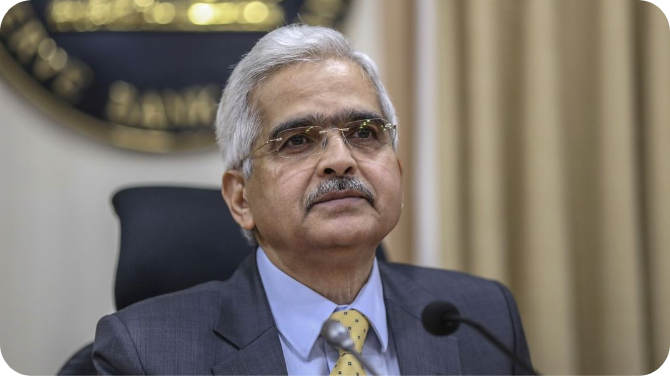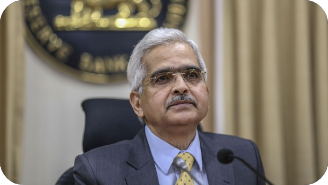Speeches - ஆர்பிஐ - Reserve Bank of India
 IST,
IST,
Speeches
Participants from the Reserve Bank of India: Shri Sanjay Malhotra – Governor, Reserve Bank of India Shri M. Rajeshwar Rao – Deputy Governor, Reserve Bank of India Shri T. Rabi Sankar – Deputy Governor, Reserve Bank of India Shri Swaminathan J. – Deputy Governor, Reserve Bank of India Dr. Rajiv Ranjan – Executive Director, Reserve Bank of India Dr. A. R. Joshi – Executive Director, Reserve Bank of India Moderator: Shri Puneet Pancholy – Chief General Manager, Reserve Bank of India Puneet Pancholy:
Participants from the Reserve Bank of India: Shri Sanjay Malhotra – Governor, Reserve Bank of India Shri M. Rajeshwar Rao – Deputy Governor, Reserve Bank of India Shri T. Rabi Sankar – Deputy Governor, Reserve Bank of India Shri Swaminathan J. – Deputy Governor, Reserve Bank of India Dr. Rajiv Ranjan – Executive Director, Reserve Bank of India Dr. A. R. Joshi – Executive Director, Reserve Bank of India Moderator: Shri Puneet Pancholy – Chief General Manager, Reserve Bank of India Puneet Pancholy:
Chairmen of Customer Service Committees of banks, Whole Time Directors in charge of Customer Service Verticals, Principal Nodal Officers and my colleagues from the Reserve Bank of India. A very good morning to you all.
We have gathered here today to discuss a crucial aspect of our banking and financial services sector: customer service standards and grievance redress mechanism in RBI regulated entities.
2. As senior functionaries overseeing this critical domain, you bear a significant responsibility in shaping the quality of customer service rendered by your respective financial institutions. The focus must be on nurturing a customer-centric approach, for trust is the bedrock of the financial services business, and customer service, along with prompt grievance redress, is the bridge to building that trust. Over the course of my address today, I would like to highlight five important areas for your consideration which are:
Chairmen of Customer Service Committees of banks, Whole Time Directors in charge of Customer Service Verticals, Principal Nodal Officers and my colleagues from the Reserve Bank of India. A very good morning to you all.
We have gathered here today to discuss a crucial aspect of our banking and financial services sector: customer service standards and grievance redress mechanism in RBI regulated entities.
2. As senior functionaries overseeing this critical domain, you bear a significant responsibility in shaping the quality of customer service rendered by your respective financial institutions. The focus must be on nurturing a customer-centric approach, for trust is the bedrock of the financial services business, and customer service, along with prompt grievance redress, is the bridge to building that trust. Over the course of my address today, I would like to highlight five important areas for your consideration which are:
Good afternoon and Namaskar.
Thank you Alfred for those insightful opening remarks. I must mention that Alfred led the IMF’s Article IV India mission for the 2021 consultations. The sheer weight of that experience and deep understanding of Indian conditions is reflected in his views. I would also like to commend Alfred and his co-editors for a comprehensive evaluation of India’s financial system and very valuable recommendations on the way forward in a recent book evocatively titled “India’s Financial System: Building the Foundation for Strong and Sustainable Growth”.
I am glad to see Mr Thomas Helbling from the Asia and Pacific Department of the IMF in this session, and I look forward to hearing from him.
I thank our host and SEACEN EXCO Chair, the National Bank of Cambodia, the SEACEN Centre and Dr. Mangal Goswami, Executive Director, and the BIS for inviting me to speak in this distinguished forum. In particular, I am grateful to Deputy
Good afternoon and Namaskar.
Thank you Alfred for those insightful opening remarks. I must mention that Alfred led the IMF’s Article IV India mission for the 2021 consultations. The sheer weight of that experience and deep understanding of Indian conditions is reflected in his views. I would also like to commend Alfred and his co-editors for a comprehensive evaluation of India’s financial system and very valuable recommendations on the way forward in a recent book evocatively titled “India’s Financial System: Building the Foundation for Strong and Sustainable Growth”.
I am glad to see Mr Thomas Helbling from the Asia and Pacific Department of the IMF in this session, and I look forward to hearing from him.
I thank our host and SEACEN EXCO Chair, the National Bank of Cambodia, the SEACEN Centre and Dr. Mangal Goswami, Executive Director, and the BIS for inviting me to speak in this distinguished forum. In particular, I am grateful to Deputy
It gives me great pleasure to be here at the 4th edition of the Global FinTech Festival (GFF). I compliment the organisers for bringing all stakeholders of the FinTech ecosystem together for this three-day event with the aim of achieving a common goal of inclusive, resilient, and sustainable financial system. It would be obvious to state that innovation is the bedrock of the FinTech industry. Events such as these festivals enable sharing of knowledge and ex
It gives me great pleasure to be here at the 4th edition of the Global FinTech Festival (GFF). I compliment the organisers for bringing all stakeholders of the FinTech ecosystem together for this three-day event with the aim of achieving a common goal of inclusive, resilient, and sustainable financial system. It would be obvious to state that innovation is the bedrock of the FinTech industry. Events such as these festivals enable sharing of knowledge and ex
1. Good Afternoon, Ladies and Gentlemen, 2. Thank you for inviting me to participate in this dialogue and the Panel Discussion on ‘Climate Implications for Central Banking’. Climate change and its impact on us is no longer a distant threat. Rising global temperatures, extreme weather events, changing weather patterns and the degradation of ecosystems are threatening our lives and livelihoods. We therefore have to face up to the challenge of climate change sooner, not later. Now, it is up to us to deal with this in a calibrated and well-planned manner or deal with it once we are pushed into a corner with little elbow room. Therefore, the timing of this dialogue is quite appropriate and provides an opportunity to discuss and deliberate on this issue.
1. Good Afternoon, Ladies and Gentlemen, 2. Thank you for inviting me to participate in this dialogue and the Panel Discussion on ‘Climate Implications for Central Banking’. Climate change and its impact on us is no longer a distant threat. Rising global temperatures, extreme weather events, changing weather patterns and the degradation of ecosystems are threatening our lives and livelihoods. We therefore have to face up to the challenge of climate change sooner, not later. Now, it is up to us to deal with this in a calibrated and well-planned manner or deal with it once we are pushed into a corner with little elbow room. Therefore, the timing of this dialogue is quite appropriate and provides an opportunity to discuss and deliberate on this issue.
கடைசியாக புதுப்பிக்கப்பட்ட பக்கம்: null
கடைசியாக புதுப்பிக்கப்பட்ட பக்கம்:
கடைசியாக புதுப்பிக்கப்பட்ட பக்கம்:















